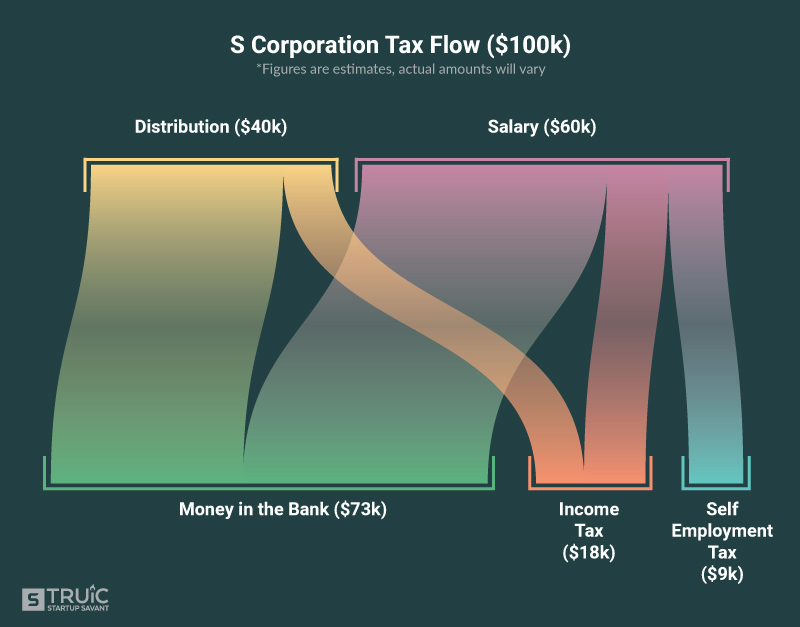S Corp vs. LLC

Last Updated: By TRUiC Team
Are you trying to decide between forming a limited liability company (LLC) or an S corporation (S corp)? If so, this article is for you!
Whether you’re just starting your business, debating about forming an LLC, or interested in designating your company as an S corp, we’ll walk you through the ins and outs of LLCs and S corps so you can decide the best legal structure and tax designation for your business.
Ready to form your business now? We recommend using a business formation service to save yourself the hassle and get your LLC or S Corp up and running.
Skip Ahead:
Legal Structure vs. Tax Designation
What Is an LLC?
What Is an S Corporation?
LLC Taxes vs. S Corp Taxes
Which Is Best, an LLC or an S Corp?
When Is It Best to Form an LLC?
When Is It Best to Elect S Corp Status?
Frequently Asked Questions
Legal Structure vs. Tax Designation
It can be difficult to compare LLCs to S corporations because an LLC is a legal business entity that separates the company from its owners while an S corporation is a tax designation that a legal business entity may elect. This article will compare the default LLC tax structure to the S corp tax designation.
- Legal Structure: A legal structure is the legal framework under which you organize your business. An LLC is one of four primary types of legal structure, which include:
- Tax Designation: A tax designation dictates how a business pays its taxes. A company’s tax designation is closely related to — but separate from — its choice of legal structure. S corporation status is a business tax designation that both LLCs and C corporations may elect.
By default, the Internal Revenue Service (IRS) treats LLCs as pass-through tax entities that are taxed as disregarded entities or partnerships, depending on their total number of owners (members). However, an LLC may elect to be taxed as S corporations if it meets the qualifications and requirements.
What Is an LLC?
LLC stands for limited liability company. An LLC is a simple, formal legal structure that defines a company as a separate business entity. The LLC structure also provides several benefits for business owners, including liability protection for their personal assets.
Flexibility
LLCs are easy to start and maintain while offering flexibility in their management and ownership. They also have several options for how they’re taxed, making them a popular choice for a wide variety of business types and sizes.
LLC Member Structure
LLCs may have one or more owners — referred to as “members.” An LLC with just one owner is called a single-member LLC while an LLC with more than one owner is known as a multi-member LLC. An LLC may be managed either by its members (in which case the LLC is member-managed) or by a manager its members nominate (manager-managed).
LLC Taxation
LLCs may select from several different tax designations, including:
- Disregarded entity (single-member LLC)
- Partnership (multi-member LLC)
- C corporation (C corp)
- S corporation (S corp)
By default, the IRS taxes LLCs either as disregarded entities (single-member LLCs) or partnerships (multi-member LLCs). In either case, the IRS considers an LLC’s profits as self-employment income for the owners. However, LLCs also have the option of electing to be taxed either as a C corp or an S corp. This gives owners the greatest degree of flexibility possible about the manner in which they share revenues and earnings.
For the purpose of this article, we’ll compare the default LLC taxation to S corp taxation.
Check out our LLC Tax Guide for more information.
If you’re ready to form your LLC, start today with the help of our free How to Start an LLC guide or get your LLC up and running within minutes using an LLC formation service.
What Is an S Corporation?
An S corp is a tax designation that an LLC or a corporation may elect. Under the S corp tax designation, a business entity’s profits and losses pass through to its shareholders. Because of this, LLCs and corporations that elect S corp status are exempt from paying corporate income tax.
The owners of an S corp instead have their business’s income taxed at the individual level — split between a reasonable salary and the remainder of the profits as distributions from the company.
S Corp Tax Advantages
S corp status can provide significant tax advantages when a business makes enough to pay its owners large sums in distributions. In general, we estimate your business needs to make $60,000 in net earnings with $20,000 in annual distributions to benefit from the tax advantages offered by S corp status.
Use our S corp tax calculator to determine if S corp status will benefit your business.
Qualifying as an S Corp
There are several rules and requirements LLCs and corporations must meet in order to qualify to elect and maintain their S corp tax designation.
S Corp Shareholders
S corps must have 100 or fewer shareholders and may only issue one class of stock. In addition, all shareholders of an S corp must be US citizens or resident aliens, or certain types of domestic estates, trusts, and tax-exempt organizations.
As a result, non-US citizens and nonresident aliens — or any other non-U.S. entity — may not own an S corp in whole or in part. US corporations and partnerships also aren’t permitted to own shares in an S corp.
Reasonable Salary
S corporation rules require that any S corp owner who simultaneously acts as a director, a manager, or who performs any work within the organization pay themselves a reasonable wage (with the appropriate taxes withheld) through the firm. The IRS, therefore, considers S corp owners employees who must pay themselves a reasonable salary.
Additional Restrictions
Various types of US institutions are barred from owning an S corp, such as financial institutions, insurance companies, and domestic and international sales corporations.
Additionally, companies that accumulate earnings and profits at the end of three straight years and earn more than 25% of their income from passive sources don’t qualify for (or qualify to maintain) S corp status.
If you’re ready to form your S corp, avoid the hassle and consider using an S corp formation service to get your business set up quickly.
LLC Taxes vs. S Corp Taxes
The difference between LLC taxes and S corporation taxes is complex. An LLC’s default tax designation is as a disregarded entity or a partnership. However, an LLC also may be an S corp. S corp status may offer tax benefits to companies, but S corp taxation is slightly more complex and requires businesses to run payroll.
Read on to learn how (default) LLC taxes and S corp taxes work.
LLC Taxes
By default, LLCs benefit from pass-through taxation. This means an LLC distributes its profits to its owners as income and the company itself isn’t taxed on the gains.
LLC members (owners) must then report revenue from the company as self-employment income on their personal tax returns where it is subjected to self-employment tax and personal income taxes.

How to File LLC Taxes
The process for filing taxes as an LLC will depend on the type of LLC you operate.
Single-Member LLCs
For tax purposes, the IRS considers single-member LLCs as disregarded entities by default. This means the owner of a single-member LLC must report and file their business profits and losses on their personal tax returns as self-employment income — just like a sole proprietor.
Single-Member LLC Tax Paperwork
Single-member LLCs don’t need to file a tax return or pay taxes to the IRS, but their owners must file:
- Form 1040 — Owners must report the revenue and expenses from their LLC to the IRS on their personal tax returns.
- Schedule C — The IRS treats single-member LLC profits as self-employment income.
- Schedule SE — Single-member LLC owners must pay self-employment tax and personal income taxes on all of their business profits.
Multi-Member LLCs
The IRS treats multi-member LLCs as partnerships by default. That means they must file an informational return with the IRS that states their revenues and losses as well as how the company passes or apportions these gains to its members (unless the firm decides to be taxed as a C corp or an S corp).
Multi-Member LLC Tax Paperwork
While multi-member LLCs must file an informational tax return with the IRS, they don’t pay taxes on their profits. The required tax forms for this type of LLC include:
- Form 1065 — Multi-member LLCs report their profits and losses to the IRS as partnership income.
- Schedule K-1 — This form shows how a multi-member LLC allocates its profits and losses among its members based on its Operating Agreement.
- Form 1040 — The members of a multi-member LLC must then report their allocation of the profits and losses from Schedule K-1 on their personal income tax returns.
-
- Schedule E — The IRS treats multi-member LLC profits as self-employment income.
- Schedule SE — Each member must pay self-employment and personal income taxes on their allocation of the income.
To learn more, read our LLC Tax Guide.
Please note that LLCs may be responsible for paying taxes and filing returns beyond what’s listed above. Each state and locality may have its own filing and tax requirements. In addition to any state requirements, LLCs with employees also must file:
S Corp Taxes
The IRS treats S corps as hybrid pass-through tax entities. This means the company’s earnings pass through to its owners (or shareholders) and its profits aren’t taxed at the company level.
S corporations differ from other pass-through entities, however, in that their business profits and losses pass through to their owners in two ways. First, S corp owners must pay themselves a reasonable salary for the work they perform within the company. Second, the remaining profits are then treated as distributions from the firm.
Reasonable Salary
S corp shareholders who serve as a director, a manager, or who perform any work within the organization must receive a reasonable salary. According to the IRS, reasonable compensation equates to “the value that would ordinarily be paid for like services by like enterprises under like circumstances.”
S corps are responsible for calculating, reporting, withholding, and paying employment and withholding taxes on all employee salaries and wages. They’re also responsible for calculating, reporting, and paying federal unemployment insurance as well as any other taxes or insurance required by their state.
Distributions
The remainder of an S corporation’s profits pass through to its shareholders in the form of dividends or distributions. Each individual shareholder is then responsible for paying personal income tax on their individual salaries and share of the profits.

How to File S Corp Taxes
S corps must take several steps to fulfill their tax-filing obligations:
- File Form 1120S: US Income Tax Return for an S Corporation along with all corresponding forms and schedules with the IRS. This form reports on an S corp’s income, deductions, shareholders, and profits and losses.
- File Schedule K-1 (Form 1120S) for each shareholder to report how the company allocated its profits and losses.
Because S corp owners must receive a reasonable salary for any work they do within the company, S corps will technically have employees. That means they’ll need to file and pay annual federal unemployment tax (FUTA) as well as employers' quarterly tax returns with the IRS. - S corps must report all employee salaries and wages paid during the year to the IRS, using the corresponding copies of Form W-2.
- S corps also must file Form 940.
- S corps also need to file Form 941: Employer’s Quarterly Federal Tax Return to report and pay the income taxes, Social Security taxes, and Medicare taxes they withheld from employees’ paychecks. They also use this form to pay their employer’s share of Social Security and Medicare taxes.
S Corp Shareholder Taxes
S corp owners must then report their wages or salaries — along with any taxes withheld (as reported on their Form W-2) — on their personal tax return (Form 1040). They also need to report any dividends or capital gains distributions as indicated on their Schedule K-1 on Schedule E.

Which Is Best, an LLC or an S Corp?
The best business and tax structure for your company highly depends on the nature of your business and your specific situation. Whether it’s better to form an LLC and/or elect to be taxed as an S corp will depend on the size of your firm, the structure of your organization, and the aims of your company, among other factors.
Here’s a quick overview of the advantages and disadvantages of LLCs and S corporations as well as when you might benefit from choosing an LLC and/or an S corp.
Many businesses turn to formation services to form their LLC and apply for an S corp tax designation.
When Is It Best to Form an LLC?
LLCs are a great form of legal business entity for many businesses. They not only provide many of the benefits of corporations but also have a much simpler structure and don’t subject their owners to double taxation.
LLC Advantages
Limited liability companies offer a number of benefits to their owners by separating them from the business entity. The key advantages of forming an LLC include:
- They’re easy to start and maintain.
- They offer a choice of taxation (pass-through by default).
- They can have an unlimited number of members.
- They can have foreign owners/investors.
- They can be owned (or partly owned) by other business entities.
LLC Disadvantages
Despite their advantages, LLCs also have some disadvantages when compared to corporations and other business entities. The main drawbacks of forming an LLC include:
- They face restrictions on the transfer of ownership.
- They may have difficulty raising capital.
- They must pay taxes on all profits – even if they don’t make disbursements.
- The IRS treats all of its profits as self-employment income.
When Is It Best to Choose Default LLC Taxation?
An LLC often is the best legal structure for a simple business and a great choice for owners who plan to invest most of their profits back into the business. LLCs provide the liability protection and credibility of a formal business entity while offering choices for taxation.
LLCs do, however, face certain restrictions and aren’t as investor-friendly as other business structures. As such, it’s often best to form an LLC when you plan to start a small or medium-sized business that won’t seek significant angel or venture capital investments.
When comparing LLCs and S corps, you may benefit from choosing to be taxed as a standard LLC until your business grows to the point that the additional time and resources associated with electing S corp status justifies the tax savings.
When Is It Best to Elect S Corp Status?
S corp status can provide a very advantageous tax designation for some businesses. Before discussing when it’s best to elect S corp status, let’s review the advantages and disadvantages of S corps.
S Corp Advantages
S corp status is a tax designation that combines the benefits of an LLC or corporation with a S corp pass-through tax treatment. It can prove beneficial for companies making enough money to pay out a reasonable salary to its owners as well as large sums in dividends. The key advantages of electing S corp status include:
- The IRS doesn’t tax their profits at the company level.
- They have the ability to pass through losses to their shareholders.
- They only pay employment taxes on salaries, not profits paid out as distributions.
- Their excess profits are distributed and taxed as capital gains distributions.
S Corp Disadvantages
S corps can be complex to operate and come with several disadvantages. For example:
- They have more complex tax reporting.
- They must distribute their profits and losses according to shareholder equity.
- They face additional bookkeeping, accounting, and tax-filing requirements.
- They may only issue one class of shares.
- They’re limited to 100 shareholders.
- Their shareholders must be US citizens or resident aliens.
- They’ll face taxation as a corporation in some states.
When Is It Best to Choose S Corp Status?
If a business already makes a substantial amount in net earnings and its owners plan to take money out of the business, it may be best for those LLCs and corporations to elect S corp status. Because S corp distributions aren’t subject to self-employment taxes, many business owners may save money in taxes by electing an S corp taxation designation.
However, S corps face restrictions on the number and type of shares they can issue and who can serve as shareholders. When compared to a default LLC tax structure, S corp status results in more complicated legal requirements and tax reporting. This tax designation often means businesses will incur additional expenses related to accounting, legal services, and payroll. Furthermore, your business will face increased IRS scrutiny to ensure you don’t abuse the system because S corp owners have an incentive to take less money in salaries and more in distributions.
That means it’s often best to elect S corp status only when the level of your LLC’s profits will allow the tax savings to justify the additional costs associated with this tax designation. While only you and your specific situation can determine that profit threshold, it generally becomes advantageous to elect S corp status when you anticipate your annual profits will reach a minimum of $60,000 to $100,000.
Still unsure if it makes sense to elect S corp status? Consult with an accountant and/or tax professional about how this tax designation will impact you and your business.
Frequently Asked Questions
Is an LLC an S corp?
An LLC can be taxed as an S corp, but not all LLCs are S corps. An LLC is a form of legal structure under which you can organize a company. In contrast, an S corporation is a tax designation that some LLCs and corporations may elect.
How are LLCs taxed?
By default, the IRS treats LLCs as disregarded entities (in the case of single-member LLCs) or partnerships (in the case of multi-member LLCs) for tax purposes.
However, an LLC may elect to be designated as a C corporation or an S corporation for tax purposes by filing the required forms with the IRS.
Are LLC owners considered self-employed?
Yes. Owning an LLC is almost always considered to be a form of self-employment. LLCs are considered pass-through entities by default, which means their profits are distributed to the business owners in the same way they’d be distributed to a sole proprietor or independent contractor. For the purpose of taxes, this is considered self-employment.
However, LLCs may also choose to be treated as C corps or S corps for tax purposes. When an LLC chooses to be taxed as a C corp or an S corp, any work an owner performs for the business must be compensated with a reasonable salary. In this case, the company would withhold employment taxes — Federal Insurance Contributions Act (FICA) and Medicare — from the owner’s wages or salary, and the IRS wouldn’t consider the owner as self-employed.
Do LLC owners pay self-employment tax?
Yes, the owners of LLCs that don’t elect to be taxed as corporations are responsible for paying self-employment taxes (i.e., FICA and Medicare) on all of the business’s profits.
Do S corp owners pay self-employment tax?
The owners of an S corporation don’t pay self-employment taxes on distributions. They’re treated as employees of the business and must be paid a reasonable salary if they perform any work for the company. Thus, if you own a company that elects S corp status, your salary is subject to employment taxes (i.e., Social Security and Medicare) — half of which is withheld from your salary as an employee and half of which the S corp pays. However, any excess business profits are treated as capital gains distributions and aren’t subject to self-employment taxes.
Can I file my own LLC taxes?
Yes, you can file your own LLC tax returns. Single-member LLCs record their company revenues and losses on their personal tax returns as self-employment income. Multi-member LLCs must submit Form 1065 to report their business profits and losses as well as Schedule K-1 to divide profits and losses among each LLC member based on the LLC’s operating agreement. LLC members must then record their portion of the earnings and losses on their personal tax returns as self-employment income.
Can you switch from an LLC to an S corp?
Yes, you can elect an S corporation tax designation by filling out and filing Form 2553 with the IRS.





